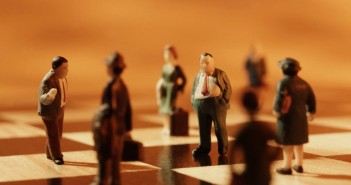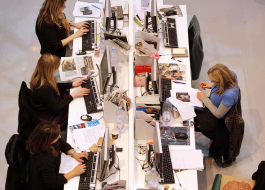 It's a jungle in there.Shutterstock
It's a jungle in there.Shutterstock
The modern office seems like a relatively safe place — after all, you're probably not dangling out of a 44th-floor window with a squeegee.
In fact, on any given workday, you encounter a number of health threats — think repetitive strain injury from using a mouse and anxiety from dealing with a tyrannical boss.
Below, Business Insider has rounded up all the surprising ways in which your office job might be slowly destroying your health.
Consider it an opportunity to swap some of your current work habits for better ones that will keep you happy and healthy.
Sitting all day could shave years off your life

Sitting for lengthy periods is terrible for your body. Aches and pains are the least of your problems — sitting too much can lead to an early death. You face a higher risk of musculoskeletal disorders, obesity, diabetes, cancer, heart disease, and more, even if you work out regularly.
Around 86% of American workers sit all day at work. If you're one of them, your best plan of action is simply to move around for a few minutes every hour.
As Business Insider's Erin Brodwin reported, one observational study found that participants who moved around for about two minutes every hour had about a 33% lower risk of dying three years later than those who sat the whole time.
Regularly slouching in your chair can lead to back pain and headaches

Take a look at your posture right now: Are you slouching — or sitting up nice and straight?
According to the Mayo Clinic, "when you slouch or stoop, your muscles and ligaments strain to keep you balanced — which can lead to back pain, headaches and other problems." Yikes.
Business Insider's Brodwin shared the best way to develop better posture at your desk, based on tips from the Cleveland Clinic:
"First, sit at the end of your chair (that's right, don't rely on your backrest). Let your body go into a slouching position.
"Now, try to sit up straight, accentuating the curve of your back as much as possible. Hold this position for a few seconds.
"Next, release the position a little bit — Cleveland specifies that you shouldn't move more than about 10 degrees. This should be your sitting position!"
Using a treadmill desk may increase your chances of physically hurting yourself

A treadmill desk may help with the risk of obesity and heart disease — and at least for a while, they were pretty trendy. But a 2013 Wall Street Journal article reported the higher incidence of falls among those using treadmill desks and stability balls.
Besides, using a treadmill desk might not even make you more productive. 2015 research suggests that, at least when you first start using one, your cognitive performance may suffer, and you're more likely to make typos.
Long commutes can lead to poor sleep, higher cholesterol, and an increased risk of depression

Commuting more than 10 miles by car can lead to higher blood sugar and increased cholesterol, according to a study from the University School of Medicine in Saint Louis and the Cooper Institute in Dallas. It can also increase your risk of depression and anxiety.
But public transit is no picnic, either. One report published by the Office of National Statistics in the UK found that people who commute 30 minutes by bus have the lowest levels of life satisfaction, and even cyclists weren't immune to the ill effects of long-distance travel.
Interestingly, recent research suggests that most of us don't realize just how miserable commuting can make us. It's something to consider before you accept your next job offer.
Motivational meetings can depress people

In April 2016, the National Labor Relations Board issued a ruling against T-Mobile because the company had included a provision in its employee handbook stating that employees should try to maintain a positive work environment.
On The New Yorker's website, Maria Konnikova explored the effects of requiring people to be happy and upbeat at work. In sum, it rarely works.
One organizational psychologist told her that while a positive work environment sounds nice, "The irony is, when you’re trying to get people to do something positive, you can't do it. Once it’s required, it's fake and forced." People may act and feel negative instead.
Recirculated, toxic air can cause illness and hurt your productivity

The EPA uses the term "Sick Building Syndrome" to describe what happens when "building occupants experience acute health and comfort effects that appear to be linked to time spent in a building, but no specific illness or cause can be identified."
Meanwhile, one small study found that workers in "green" buildings — with better ventilation and lower carbon dioxide and VOC (volatile organic compound) concentrations — scored higher on some tests of cognitive function than workers in "conventional" buildings.
Working for more than 55 hours a week may increase your stroke risk

A 2015 review from researchers at University of College London found that people who work more than 55 hours a week have a whopping 33% greater risk of stroke. The review adds to a growing body of research on the health hazards of long work hours.
It's not like you're getting more work done, either: Research suggests that after working 60 hours a week for three weeks, our productivity starts to plummet.
Working for a bad boss can contribute to anxiety, unhealthy habits, and even heart disease

One Swedish study cited by The Washington Post found the chronic stress of a bad boss was linked to an elevated risk of heart disease — and the longer you work for that person, the worse the problem seems to become.
That's just the beginning. Other studies have shown that working for an unfair boss may contribute to a host of other complaints, including depression, sleep issues, high blood pressure, and being overweight.
Working odd hours can cause weight gain and increase stress hormone levels

Those who mostly work in the evenings — such as programmers — are at greater risk for Type 2 diabetes, cancer, and heart disease, according to an article in The Atlantic.
A study led by Harvard researchers in 2009 found that people who woke up later in the day showed a decline in leptin, a hormone responsible for curbing appetites, and an increase in the stress-related hormone cortisol.
Endlessly staring at a computer screen can (temporarily) harm your vision

"Computer vision syndrome" refers to symptoms like irritated and tired eyes that result from starting at a digital screen all day. As Business Insider's Kevin Loria reported, one report found that the syndrome affects more than 60% of Americans.
One way to avoid eye strain is to implement the 20-20-20 rule: After every 20 minutes of work, take 20 seconds to look at something 20 feet away.
As Loria explains, "Your eyes have muscles that help them move and focus on different objects, but if we stare at a screen the same distance away for hours at a time, those muscles have a hard time adjusting once we move again."
Not getting enough sunlight can make it harder to fall asleep and more difficult to concentrate when you're awake

Artificial light doesn't just give your skin an unflattering greenish cast — it also messes with your internal clock, making you sleepy and sedentary.
A study in the Journal of Clinical Sleep Medicine found that employees who weren't exposed to natural light at work slept an average of 46 minutes less a night than their peers with windows — and the sleep they did get was less restful.
Extreme boredom can increase your risk of dying from heart disease or stroke

It's not just hyperbole — you can actually be bored to death.
A study from University College London suggested that those who complain of boredom are more likely to die young, and those who report high levels of tedium are much more likely to die from heart disease or stroke.
The researchers are quick to note that boredom may not directly cause fatal illnesses — it's also possible that people who are bored engage in harmful behaviors such as drug use.
Most workspaces and keyboards are welcome environments for germs

The office can be a breeding ground for bacteria if it's not kept clean.
A fascinating study from the University of Arizona, highlighted in The Wall Street Journal, traced the path of a single virus (which doesn't infect people) throughout an office building.
Sumathi Reddy writes in the Journal:
"Within two hours, the virus had contaminated the break room—coffee pot, microwave button, fridge door handle—and then spread to restrooms, individual offices and cubicles. There, researchers found, the virus had heavily contaminated phones, desks and computers.
"By four hours, they found the virus on more than 50% of the commonly touched surfaces and on hands of about half of the employees in the office."
Experts disagree on whether hand sanitizers are helpful — or whether they're counterproductive because they kill good bacteria, too. Another way to prevent the spread of germs? Stop shaking people's hands.
Open-office plans may be trendy, but they're also drastically more likely to make you sick

Nearly 70% of offices have ditched cubes for open plans, but while that may (may) increase some kinds of communication and collaboration, it's also making us sick.
A 2011 Danish study found that as the number of people working in a room increased, so did the relative number of sick days — and people who worked in fully open offices were out 62% more than their cubed counterparts.
Keeping your mouse in the same spot makes you prone to repetitive strain injury

If your mouse stays in the same spot all day, you can be prone to repetitive strain injury (RSI).
Upper-limb RSI occurs when your tendons are straining more than they should for long periods of time, which can be because of movement repetition, a sustained awkward position, or prolonged pressing against hard surfaces.
One option is to use a mouse platform and a forearm support, so you reduce the area you use the mouse in. Another option is to use a shorter keyboard, so you make fewer sideways movements.
Smartphone overuse may cause inflammation in your thumb

People who use their smartphones heavily to text and email may wind up injuring their thumbs, since that's the go-to typing finger for many people.
As a physician at the Philadelphia Hand Center told TODAY, overuse may cause inflammation in the area — which can lead to aching, cramping, and throbbing — or even osteoarthritis.
The physician said the best treatment is usually rest and ice.
Uncomfortable shoes may eventually lead to spinal injuries, muscle spasms, and chronic headaches

Those power pumps you're wearing might make you feel tall and confident, but they're also harming your body in surprising ways.
Between 2005 and 2009, women's visits to doctors for their feet increased by 75%, according to the American Academy of Orthopedic Surgeons (AAOS).
As an orthopedic surgeon told Health.com, wearing uncomfortable shoes can cause your back to curve, potentially leading to spinal injuries, muscle spasms, and even chronic headaches and migraines.
Jacquelyn Smith, Rachel Sugar, Vivian Giang, and Kim Bhasin contributed to earlier versions of this article.




